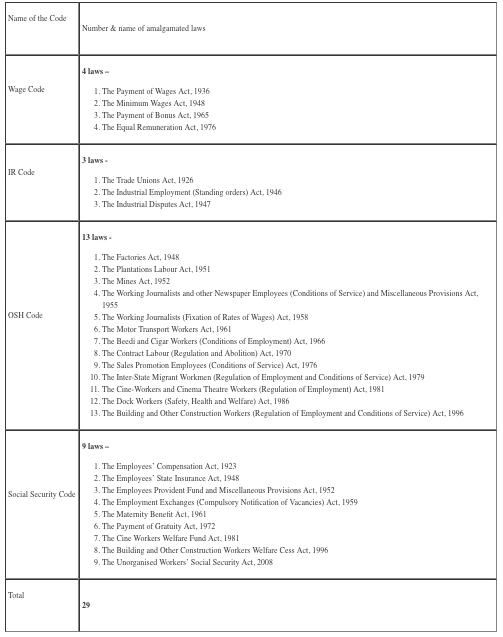
New Delhi: Lok Sabha today passed three Labour Codes amidst boycott by the Opposition. In the absence of the Opposition members, amendments proposed by them was not taken up and the Bills were passed. They will now be tabled in the Rajya Sabha on September 28.
The new labour codes cover over 50 crore workers from organized, unorganized and self employed for minimum wages, social security.
The 3 bills which were passed in the Lok Sabha today are (i) Industrial Relations Code, 2020 (ii) Code on Occupational Safety, Health & Working Conditions Code, 2020 & (iii) Social Security Code, 2020.
These bills were part of Government’s desire to bring labour welfare reforms in the country which was not done for the last 73 years. In the last 6 years, many multi-stakeholders consultations were held with all stakeholders i.e. Trade unions, Employers, State Governments and experts of labour sector. This also included holding 9 tripartite consultations, four Sub Committee meetings and 10 Regional Conferences, 10 inter-ministerial consultations and views of citizens.
The Minister for Labour and Employment Santosh Gangwar, while replying to the issues raised by the Members of Lok Sabha, said that the Bills took into account the holistic development of the country by keeping the labour interest uppermost in the mind. He further said that 29 labour laws were being subsumed in the simplified, easy to understand transparent 4 labour codes. Out of the 4 labour codes, Code on Wages had already been passed by Parliament and had become the law of the land. All the labour laws (29 in number) being amalgamated into 4 labour codes were :

- 12 Labour Acts were already repealed since 2014
Elaborating the benefits of the new labour codes, Gangwar informed the House that the entire workforce of the country will now be entitled for obtaining benefits under different codes. Minister mentioned the salient features of the 3 Codes which were passed by the Lok Sabha,
as under :-
(A) Social Security Code, 2020
Extending the reach of ESIC:
- The facility of ESIC would now be provided in all 740 districts. At present, this facility is being given in 566 districts only.
- Establishments working in hazardous sectors would mandatorily be linked with ESIC, even if there is only one worker working in it.
- Provision for making scheme for linking unorganised sector and Gig workers with ESIC.
- Option to link workers working in Plantations is being given to Plantation owners.
- Option for becoming member of ESIC is also being given to establishments with less than 10 workers.
Extending the reach of mployees’ Provident Fund Organisation (EPFO):
- EPFO’s coverage would be applicable on all establishments having 20 workers. At present, it was applicable only on establishments included in the Schedule.
- Option to join EPFO is also being given to establishments having less than 20 workers.
- Schemes would be formulated for bringing workers coming under the category of ‘Self-employed’ or falling under any other category under the aegis of EPFO.
- Provision has been made to formulate various schemes for providing comprehensive social security to workers in unorganised sector. A “Social Security Fund” will be created on the financial side in order to implement these schemes.
- Work to bring newer forms of employment created with the changing technology like “platform worker or gig worker” into the ambit of social security has been done in the Social Security Code. India is one of the few countries where this unprecedented step to bring workers in this category under social security has been taken.
- Provision for Gratuity has been made for Fixed Term Employee and there would not be any condition for minimum service period for this. For the first time, a Fixed Term Employee working for a determined period on contract has been given the right of social security like a Regular Employee.
- With the aim of making a national database for unorganised sector workers, registration of all these workers would be done on an online portal and this registration would be done on the basis of Self Certification through a simple procedure. It would facilitate the extension of benefits of various social security schemes to beneficiaries in the unorganised sector. We can say that we would be able to get ‘Targeted Delivery” of social security done to unorganised sector workers with the help of this database.
- The most important thing for getting employment is the information about job vacancies. With this aim, it has been made mandatory for all establishments with 20 or more workers to report the vacancy position in their establishments. This information would be given on online portal.
(B) Occupational Safety, Health & Working Conditions Code, 2020
- Free health checkup once a year by the employer for workers which are more than a certain age.
- Legal right for getting Appointment Letter given to workers for the first time.
- Cine Workers have been designated as Audio Visual Worker, so that more and more workers get covered under the OSH code. Earlier, this security was being given to artists working in films only.
(C) Industrial Relations Code, 2020
For quickly resolving disputes of the workers :
- Provision for two members instead of one member in the Industrial Tribunal. In case of absence of one member, work can still be undertaken smoothly.
- Provision for taking the matter straight to the Tribunal in case the dispute is not resolved at conciliation stage. At present, the case is referred to the Tribunal by the appropriate Government.
- Implementation of award in 30 days after Tribunal award.
- After recognition of Fixed Term Employment, workers will get the option of Fixed Term Employment instead of contract labour. Under this, they would get benefits of hours of work, salary, social security and other welfare benefits like a Regular Employee.
- With the objective of better and effective participation of Trade Unions, a provision for “Negotiating Union” and “Negotiating Council” has been made for undertaking negotiation on any dispute. With conferring of this recognition, resolving disputes through dialogue would be facilitated and workers would be better able to get their rights.
- Arrangement for going to the Tribunal has been made for resolving disputes arising between Trade Unions. Less time would be required for resolving their disputes.
- Provision has been made for giving recognition to Trade Unions at Central and State level. This recognition has been given in the labour laws for the first time and after this recognition, Trade Unions would be able to contribute more affirmatively and more effectively at the Central and State level.
- Provision for RE-Skilling fund has been made in the law for the first time. Its aim would be to re-skill those workers who have been fired from their jobs, so that they are easily able to get employment again. For this, workers would be given 15 days salary within a period of 45 days.
Gangwar said the definition of migrant workers was also extended, so that migrant workers moving from one state to another on their own and migrant workers who had been appointed by the employer from a different state could also be brought under the ambit of OSH code. At present, only migrant workers who had been brought through the contractor were benefiting from these provisions. The Minister also elaborated following benefits of the Labour Codes :
- Compulsory facility for Helpline for redressal of problems of migrant workers.
- Making a national database of migrant workers.
- Provision for accumulation of one day leave for every 20 days worked, when work has been done for 180 days instead of 240 days.
- Equality for women in every sphere : Women have to be permitted to work in every sector at night, but it has to be ensured that provision for their security is made by the employer and consent of women is taken before they work at night.
- In the event of death of a worker or injury to a worker due to an accident at his workplace, at least 50 % share of the penalty would be given. This amount would be in addition to Employees Compensation.
- Provision of “Social Security Fund” for 40 Crore unorganized workers alongwith GIG and platform workers and will help Universal Social Security coverage
- Pay parity to women workers as compared to their male counterparts.
- Occupational Safety & Health Code to also can now over cover workers from IT and Service Sector.
- 14 days notice for Strike so that in this period amicable solution comes out.
- Vibrant mechanism proposed for speedier disposal by Labour Tribunals as “Justice delayed is Justice denied”.
- The Codes to Promote Harmonious Industrial Relations for higher productivity and more employment generation.
- Labour Codes to establish transparent, answerable and simple mechanism reducing registration requirement to just one from eight; need of licence also to just one from three four under different laws earlier.
- Inspector to be now made as Inspector – cum- Facilitator and introduction of Random, Web Based Inspection System to remove to Inspector Raj.
- Penalties increase manifold; to act as deterrent.
Gangwar stressed that the changes and reforms in the labour laws have been conceptualized keeping in mind the changing scenario over the years and also making them futuristic so that country marches on faster growth trajectory.
– globalbihari bureau
[the_ad_placement id=”sidebar-feed”]




